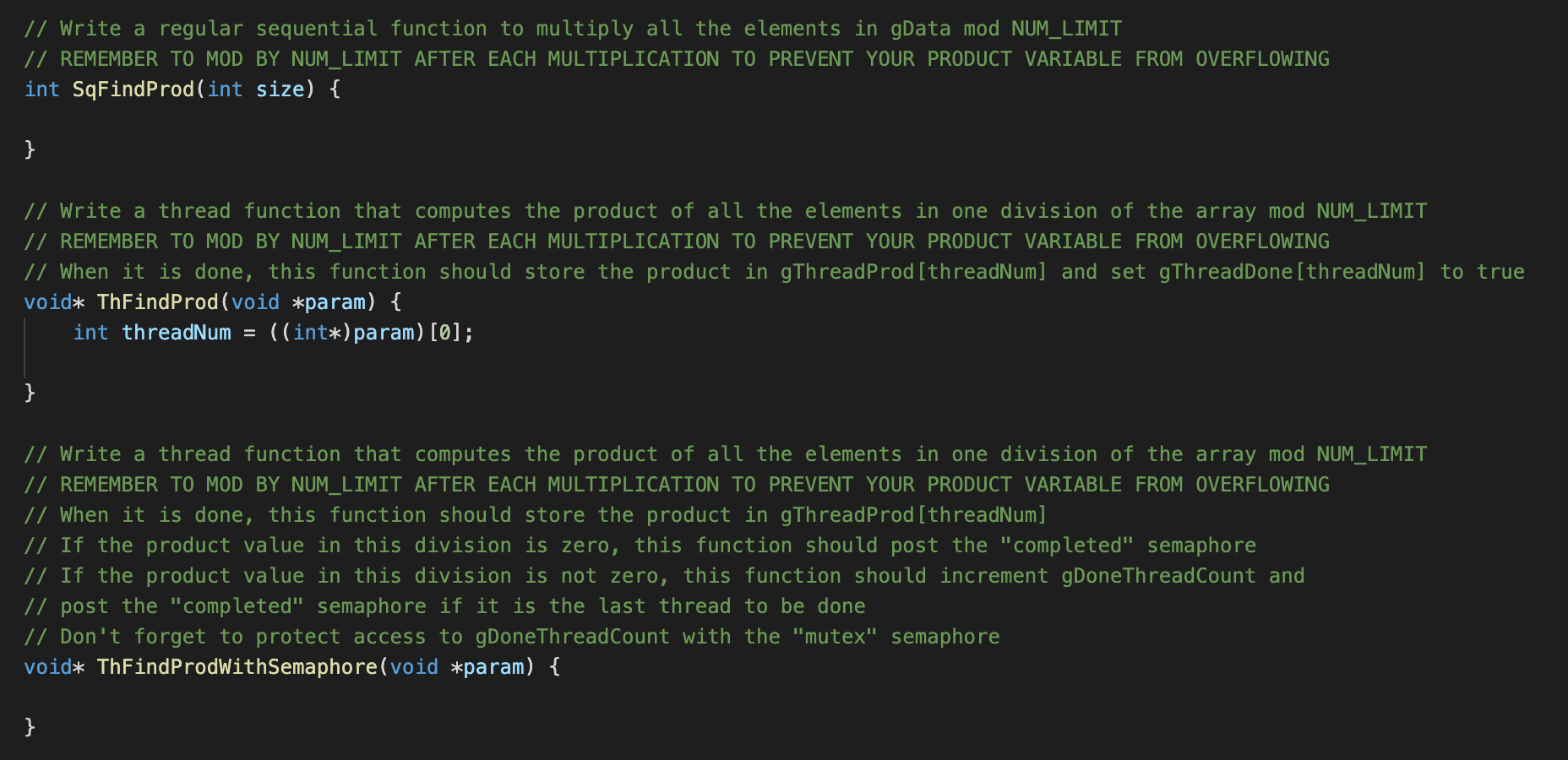Question: undefined // Write a regular sequential function to multiply all the elements in gData mod NUM_LIMIT // REMEMBER TO MOD BY NUM_LIMIT AFTER EACH MULTIPLICATION
 undefined
undefined
// Write a regular sequential function to multiply all the elements in gData mod NUM_LIMIT // REMEMBER TO MOD BY NUM_LIMIT AFTER EACH MULTIPLICATION TO PREVENT YOUR PRODUCT VARIABLE FROM OVERFLOWING int SqFindProd (int size) { } // Write a thread function that computes the product of all the elements in one division of the array mod NUM_LIMIT // REMEMBER TO MOD BY NUM_LIMIT AFTER EACH MULTIPLICATION TO PREVENT YOUR PRODUCT VARIABLE FROM OVERFLOWING // When it is done, this function should store the product in gThreadProd [threadNum] and set gThreadDone [threadNum] to true void* ThFindProd (void *param) { int threadNum = ((int*)param)[0]; } // Write a thread function that computes the product of all the elements in one division of the array mod NUM_LIMIT // REMEMBER TO MOD BY NUM_LIMIT AFTER EACH MULTIPLICATION TO PREVENT YOUR PRODUCT VARIABLE FROM OVERFLOWING // When it is done, this function should store the product in gThreadProd [threadNum] // If the product value in this division is zero, this function should post the "completed" semaphore // If the product value in this division is not zero, this function should increment gDoneThreadCount and // post the "completed" semaphore if it is the last thread to be done // Don't forget to protect access to gDoneThreadCount with the "mutex" semaphore void* ThFindProdWithSemaphore(void *param) { } // Write a regular sequential function to multiply all the elements in gData mod NUM_LIMIT // REMEMBER TO MOD BY NUM_LIMIT AFTER EACH MULTIPLICATION TO PREVENT YOUR PRODUCT VARIABLE FROM OVERFLOWING int SqFindProd (int size) { } // Write a thread function that computes the product of all the elements in one division of the array mod NUM_LIMIT // REMEMBER TO MOD BY NUM_LIMIT AFTER EACH MULTIPLICATION TO PREVENT YOUR PRODUCT VARIABLE FROM OVERFLOWING // When it is done, this function should store the product in gThreadProd [threadNum] and set gThreadDone [threadNum] to true void* ThFindProd (void *param) { int threadNum = ((int*)param)[0]; } // Write a thread function that computes the product of all the elements in one division of the array mod NUM_LIMIT // REMEMBER TO MOD BY NUM_LIMIT AFTER EACH MULTIPLICATION TO PREVENT YOUR PRODUCT VARIABLE FROM OVERFLOWING // When it is done, this function should store the product in gThreadProd [threadNum] // If the product value in this division is zero, this function should post the "completed" semaphore // If the product value in this division is not zero, this function should increment gDoneThreadCount and // post the "completed" semaphore if it is the last thread to be done // Don't forget to protect access to gDoneThreadCount with the "mutex" semaphore void* ThFindProdWithSemaphore(void *param) { }
Step by Step Solution
There are 3 Steps involved in it

Get step-by-step solutions from verified subject matter experts


